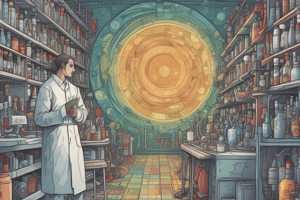Podcast
Questions and Answers
What is the primary purpose of immunity in the body?
What is the primary purpose of immunity in the body?
- To resist or eliminate harmful foreign materials or abnormal cells (correct)
- To regulate body temperature
- To enhance physical strength
- To assist in digestion
Which of the following substances is classified as a foreign material?
Which of the following substances is classified as a foreign material?
- Muscle Tissue
- Fungi (correct)
- Blood Cells
- Neurons
What defines abnormal cells in the context of immunity?
What defines abnormal cells in the context of immunity?
- Normal cells undergoing apoptosis
- Healthy cells exposed to foreign substances
- Cells that have changed from their normal form and function (correct)
- Cells that are overactive
Which of the following is NOT typically considered a harmful foreign material?
Which of the following is NOT typically considered a harmful foreign material?
What types of harmful substances does the diagram surrounding the body include?
What types of harmful substances does the diagram surrounding the body include?
What are serological reactions primarily used for?
What are serological reactions primarily used for?
Why are serological tests considered 'simple'?
Why are serological tests considered 'simple'?
Which of the following is NOT an example of a serological test?
Which of the following is NOT an example of a serological test?
What is a characteristic of the indicator systems used in serological tests?
What is a characteristic of the indicator systems used in serological tests?
How do serological reactions provide results?
How do serological reactions provide results?
What is the primary purpose of immunodiagnostic methods?
What is the primary purpose of immunodiagnostic methods?
What role does the antigen play in the immune response?
What role does the antigen play in the immune response?
Which technique is used to separate molecules based on their size and charge?
Which technique is used to separate molecules based on their size and charge?
What is the function of a labeled antibody in immunodiagnostic methods?
What is the function of a labeled antibody in immunodiagnostic methods?
What does the blotting technique accomplish in immunodiagnostic processes?
What does the blotting technique accomplish in immunodiagnostic processes?
What type of test directly measures the binding of antigen to antibody?
What type of test directly measures the binding of antigen to antibody?
Which of the following is an example of a secondary binding test?
Which of the following is an example of a secondary binding test?
What defines an in vivo test?
What defines an in vivo test?
Which method is specifically classified as a primary binding test?
Which method is specifically classified as a primary binding test?
Which type of serologic test measures the results of antigen-antibody interaction in vitro?
Which type of serologic test measures the results of antigen-antibody interaction in vitro?
Which condition would lead to the rejection of a serum or plasma specimen?
Which condition would lead to the rejection of a serum or plasma specimen?
What should be done with lipemic specimens that are collected?
What should be done with lipemic specimens that are collected?
How soon must specimens be processed after collection to avoid rejection?
How soon must specimens be processed after collection to avoid rejection?
Which of the following scenarios is acceptable for specimen handling?
Which of the following scenarios is acceptable for specimen handling?
What is a requirement for the storage of bacterially contaminated specimens?
What is a requirement for the storage of bacterially contaminated specimens?
Flashcards are hidden until you start studying
Study Notes
Immunity
- Immunity is the body's ability to resist or eliminate harmful substances or abnormal cells.
- Foreign materials include viruses, toxins, carcinogens, fungi, and bacteria.
- Abnormal cells are cells that have changed from their normal form and function.
Serological Tests
- Serological reactions are in vitro antigen-antibody reactions used for disease diagnosis and identifying and quantifying antigens and antibodies.
- These techniques are "simple" because they directly demonstrate reactions without needing indicator systems or specialized equipment.
- Some examples of these tests include agglutination reactions and precipitation reactions.
Immunodiagnostic Methods
- Immunodiagnostic methods utilize antigen-antibody binding to identify and quantify specific antigens or antibodies in a sample.
- These techniques often involve electrophoresis, blotting, and labeled antibodies.
Types of Serologic Tests
- Primary binding tests directly measure antigen-antibody binding, like RIA and IF.
- Secondary binding tests measure the results of antigen-antibody interaction in vitro, examples include precipitation and complement fixation.
- In vivo tests measure the protective effect of antibodies in a host, such as passive cutaneous anaphylaxis.
Specimen Collection & Processing
- Serum and Plasma specimens must be free of gross contamination.
- Specimens should be received within 24 hours.
- Hemolyzed, lipemic, or bacterially contaminated specimens should be frozen unless specifically addressed.
Studying That Suits You
Use AI to generate personalized quizzes and flashcards to suit your learning preferences.




